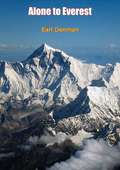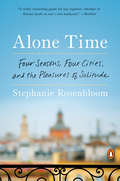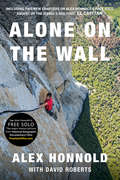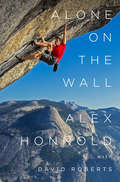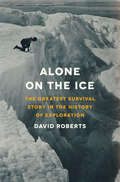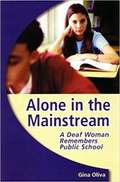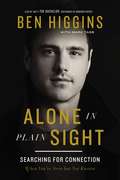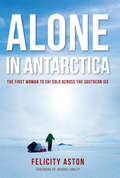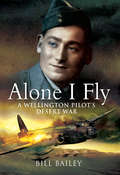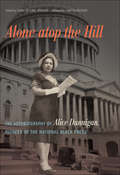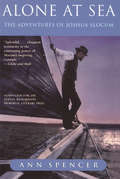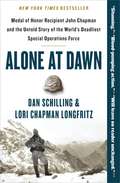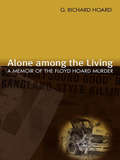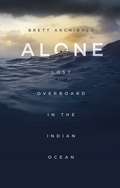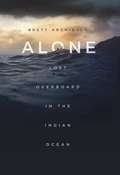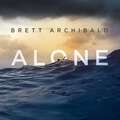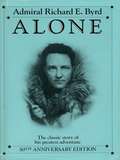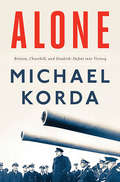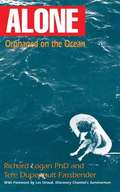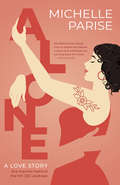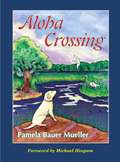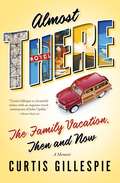- Table View
- List View
Alone to Everest
by Earl DenmanThe story of some of Earl Denman’s mountaineering exploits to Africa, culminating in his journey in 1947 through Tibet to Everest with Tenzing Norgay (later to become one of the first two individuals known to reach the summit of Mount Everest) is here told for the first time.Alone to Everest tells the remarkable story of a remarkable man. Among many present-day accounts of hardship and adventure, it stands out as the testimony of a man for whom modern civilisation and modern equipment mean little, and who is happiest, as he says, “walking barefoot on warm grass or wet rocks; in probing deep into cool, quiet forests; in days of healthy activity and evenings of restfulness spent beside a warming fire.” Denman’s achievements in the Belgian Congo—where with only local guides as companions he became one of the first men to climb all eight of the high and remove Virunga Mountains—made him realise that he would never rest until he had made a similar expedition to the highest mountain in the world. At the time £250 was all he had in the world; his equipment was of the simplest and cheapest. His journey by sea and land to Darjeeling was made under great difficulties. His meeting with Karma Paul, who introduced him to Tenzing and his friend Ang Dowa, was entirely fortuitous; he was expressly forbidden to enter Tibet (Nepal at that time was entirely closed to the Western world). Yet with all these handicaps he and the two Sherpas set off alone from Darjeeling, made their way, with many mishaps, through Sikkim and Tibet to the Rongbuk monastery, and thence to Everest itself. Appalling weather conditions finally drove them back, but not before they had attained a height of 23,500 feet.Everest has now been climbed, and no doubt will be again. But Denman’s feat, though superficially unsuccessful, remains a triumph against fantastic odds.
Alone Time: Four Seasons, Four Cities, and the Pleasures of Solitude
by Stephanie RosenbloomA wise, passionate account of the pleasures of travelling soloIn our increasingly frantic daily lives, many people are genuinely fearful of the prospect of solitude, but time alone can be both rich and restorative, especially when travelling. Through on-the-ground reporting and recounting the experiences of artists, writers, and innovators who cherished solitude, Stephanie Rosenbloom considers how being alone as a traveller--and even in one's own city--is conducive to becoming acutely aware of the sensual details of the world--patterns, textures, colors, tastes, sounds--in ways that are difficult to do in the company of others.Alone Time is divided into four parts, each set in a different city, in a different season, in a single year. The destinations--Paris, Istanbul, Florence, New York--are all pedestrian-friendly, allowing travelers to slow down and appreciate casual pleasures instead of hurtling through museums and posting photos to Instagram. Each section spotlights a different theme associated with the joys and benefits of time alone and how it can enable people to enrich their lives--facilitating creativity, learning, self-reliance, as well as the ability to experiment and change. Rosenbloom incorporates insights from psychologists and sociologists who have studied solitude and happiness, and explores such topics as dining alone, learning to savor, discovering interests and passions, and finding or creating silent spaces. Her engaging and elegant prose makes Alone Time as warmly intimate an account as the details of a trip shared by a beloved friend--and will have its many readers eager to set off on their own solo adventures.
Alone on the Wall (Expanded edition): Alex Honnold And The Ultimate Limits Of Adventure
by David Roberts Alex HonnoldIncluding two new chapters on Alex Honnold’s free solo ascent of the iconic 3,000-foot El Capitan in Yosemite National Park. On June 3rd, 2017, Alex Honnold became the first person to free solo Yosemite's El Capitan—to scale the wall without rope, a partner, or any protective gear—completing what was described as "the greatest feat of pure rock climbing in the history of the sport" (National Geographic) and "one of the great athletic feats of any kind, ever" (New York Times). Already one of the most famous adventure athletes in the world, Honnold has now been hailed as "the greatest climber of all time" (Vertical magazine). Alone on the Wall recounts the most astonishing achievements of Honnold’s extraordinary life and career, brimming with lessons on living fearlessly, taking risks, and maintaining focus even in the face of extreme danger. Now Honnold tells, for the first time and in his own words, the story of his 3 hours and 56 minutes on the sheer face of El Cap, which Outside called "the moon landing of free soloing…a generation-defining climb. Bad ass and beyond words…one of the pinnacle sporting moments of all time."
Alone on the Wall: Alex Honnold And The Ultimate Limits Of Adventure
by David Roberts Alex HonnoldThe life and death-defying feats of Alex Honnold, a visionary climber of the sort that comes along only once in a generation. Only a few years ago, Alex Honnold was little known beyond a small circle of hardcore climbers. Today, at the age of thirty, he is probably the most famous adventure athlete in the world. In that short time, he has proven his expertise in many styles of climbing and has shattered speed records, pioneered routes, and won awards within each discipline. More spectacularly still, he has pushed the most extreme and dangerous form of climbing far beyond the limits of what anyone thought was possible. Free soloing, Honnold's specialty, is a type of climbing performed without a rope, a partner, or hardware--such as pitons, nuts, or cams--for aid or protection. The results of climbing this way are breathtaking, but the stakes are ultimate: if you fall, you die. In Alone on the Wall, Honnold recounts the seven most astonishing climbing achievements so far in his meteoric and still-evolving career. He narrates the drama of each climb, along with reflective passages that illuminate the inner workings of his highly perceptive and discerning mind. We share in the jitters and excitements he feels waking in his van (where he lives full time) before a climb; we see him self-criticize in his climbing journal (a veritable bible for students of the sport); and we learn his secrets to managing fear--his most enviable talent. Veteran climber and award-winning author David Roberts writes part of each chapter in his own voice, and he calls on other climbers and the sport's storied past to put Alex's tremendous accomplishments in perspective. Whenever Honnold speaks in public, he is asked the same two questions: "Aren't you afraid you're going to die?" and "Why do you do this?" Alone on the Wall takes us around the world and through the highs and lows in the life of a climbing superstar to answer those fascinating questions. Honnold's extraordinary life, and his idiosyncratic worldview, have much to teach us about risk, reward, and the ability to maintain a singular focus, even in the face of extreme danger.
Alone on the Ice: The Greatest Survival Story in the History of Exploration
by David Roberts"An important missing story from the heroic age of Antarctic exploration."--Laurence Gonzales, author of Deep Survival On January 17, 1913, alone and near starvation, Douglas Mawson, leader of the Australasian Antarctic Expedition, was hauling a sledge to get back to base camp. The dogs were gone. Now Mawson himself plunged through a snow bridge, dangling over an abyss by the sledge harness. A line of poetry gave him the will to haul himself back to the surface. Mawson was sometimes reduced to crawling, and one night he discovered that the soles of his feet had completely detached from the flesh beneath. On February 8, when he staggered back to base, his features unrecognizably skeletal, the first teammate to reach him blurted out, "Which one are you?" This thrilling and almost unbelievable account establishes Mawson in his rightful place as one of the greatest polar explorers and expedition leaders. It is illustrated by a trove of Frank Hurley's famous Antarctic photographs, many never before published in the United States.
Alone in the Mainstream: A Deaf Woman Remembers Public School (Gallaudet New Deaf Lives #1)
by Gina A. OlivaWhen Gina Oliva first went to school in 1955, she didn’t know that she was “different.” If the kindergarten teacher played a tune on the piano to signal the next exercise, Oliva didn’t react because she couldn’t hear the music. So began her journey as a “solitary,” her term for being the only deaf child in the entire school. Gina felt alone because she couldn’t communicate easily with her classmates, but also because none of them had a hearing loss like hers. It wasn’t until years later at Gallaudet University that she discovered that she wasn’t alone and that her experience was common among mainstreamed deaf students. Alone in the Mainstream recounts Oliva’s story, as well as those of many other solitaries. In writing this important book, Oliva combined her personal experiences with responses from the Solitary Mainstream Project, a survey that she conducted of deaf and hard of hearing adults who attended public school. Oliva matched her findings with current research on deaf students in public schools and confirmed that hearing teachers are ill-prepared to teach deaf pupils, they don’t know much about hearing loss, and they frequently underestimate deaf children. The collected memories in Alone in the Mainstream add emotional weight to the conviction that students need to be able to communicate freely, and they also need peers to know they are not alone.
Alone in Plain Sight: Searching for Connection When You're Seen but Not Known
by Ben HigginsAre you tired of people knowing who you are but no one really knowing you?As the star of the twentieth season of The Bachelor, Ben Higgins looked like he had it all together. Instead, Ben felt dissatisfied, fearful, and deeply alone. Like so many of us, he thought of himself as the kid who never got picked for the game, the person always on the outside of the joke, the friend who knew a lot of people but was never truly known. He wondered if he mattered at all.In Alone in Plain Sight, Ben vulnerably shares how he found authentic connection with himself, with others, and with God. As Ben helps us name our own yearning for meaning, he exploresways to understand ourselves more deeply so that we are free to connect with others;how shared pain can bridge even the widest gaps between two very different people; why we must deconstruct our culture&’s fairy-tale view of love; andhow the God who longs for relationship with us is the answer to our need for connection.As Ben discovered, in a disconnected world, it is still possible to have lasting purpose and peace. You are already known. You are already loved. You are already seen. Discover how to live out how much you matter as you embrace the true meaning of your one incredible life.
Alone in Antarctica: The First Woman to Ski Solo Across the Southern Ice
by Felicity AstonIn the whirling noise of our advancing technological age, we are seemingly never alone, never out-of-touch with the barrage of electronic data and information.Felicity Aston, physicist and meteorologist, took two months off from all human contact as she became the first woman -- and only the third person in history - to ski across the entire continent of Antarctica alone. She did it, too, with the simple apparatus of cross-country, without the aids used by her prededecessors - two Norwegian men - each of whom employed either parasails or kites.Aston's journey across the ice at the bottom of the world asked of her the extremes in terms of mental and physical bravery, as she faced the risks of unseen cracks buried in the snow so large they might engulf her and hypothermia due to brutalizing weather. She had to deal, too, with her emotional vulnerability in face of the constant bombardment of hallucinations brought on by the vast sea of whiteness, the lack of stimulation to her senses as she faced what is tantamount to a form of solitary confinement.Like Cheryl Strayed's Wild, Felicity Aston's Alone in Antarctica becomes an inspirational saga of one woman's battle through fear and loneliness as she honestly confronts both the physical challenges of her adventure, as well as her own human vulnerabilities.
Alone I Fly: A Wellington Pilot's Desert War
by Bill BaileyThe riveting firsthand account of an RAF pilot&’s adventures in World War II—from life-and-death situations to unusual posts that test his usual good humor. After several years at sea, Sgt Bill Bailey arrived in Cairo in 1942 as a new recruit to the RAF, hoping to fulfill his ambition to fly bombers. Within hours of his arrival he is sent on his first bombing mission as second pilot in a 104 Squadron Wellington. Hit by enemy gunfire, his aircraft suffered continual loss of altitude until hitting a rock outcrop and disintegrating. Bailey came to lying alone on a precipitous ledge and soon realized that he was the sole survivor. To stay alive in temperatures of over 100 degrees, he trudged over seemingly endless dunes at dusk and dawn, his energy gradually fading. Though he ultimately found shelter in an abandoned German reconnaissance truck, he gradually resigned himself to death. But with a last desperate inspiration Bailey realized that it might be possible to attract attention by heliograph. He found enough equipment in the truck and rigged a mast with the mirror at the top and commenced signaling, eventually being rescued by a Long Range Desert Patrol. After recuperation, Bailey rejoined his squadron and was given a new crew with whom he completed his tour. He was then sent to Malta where much to his amazement he was made ground controller of a satellite fighter airfield. This is Bailey&’s uniquely harrowing and humorous account of situations beyond his control—both in and out of the cockpit—during the Second World War.
Alone I Fly: A Wellington Pilot's Desert War
by Bill BaileyThe riveting firsthand account of an RAF pilot&’s adventures in World War II—from life-and-death situations to unusual posts that test his usual good humor. After several years at sea, Sgt Bill Bailey arrived in Cairo in 1942 as a new recruit to the RAF, hoping to fulfill his ambition to fly bombers. Within hours of his arrival he is sent on his first bombing mission as second pilot in a 104 Squadron Wellington. Hit by enemy gunfire, his aircraft suffered continual loss of altitude until hitting a rock outcrop and disintegrating. Bailey came to lying alone on a precipitous ledge and soon realized that he was the sole survivor. To stay alive in temperatures of over 100 degrees, he trudged over seemingly endless dunes at dusk and dawn, his energy gradually fading. Though he ultimately found shelter in an abandoned German reconnaissance truck, he gradually resigned himself to death. But with a last desperate inspiration Bailey realized that it might be possible to attract attention by heliograph. He found enough equipment in the truck and rigged a mast with the mirror at the top and commenced signaling, eventually being rescued by a Long Range Desert Patrol. After recuperation, Bailey rejoined his squadron and was given a new crew with whom he completed his tour. He was then sent to Malta where much to his amazement he was made ground controller of a satellite fighter airfield. This is Bailey&’s uniquely harrowing and humorous account of situations beyond his control—both in and out of the cockpit—during the Second World War.
Alone atop the Hill: The Autobiography of Alice Dunnigan, Pioneer of the National Black Press (A\sarah Mills Hodge Fund Publication)
by Alice DunniganThe memoir of &“the first African American female reporter to gain entry into the closed society of the White House and congressional news correspondents&” (Hank Klibanoff, coauthor of the Pulitzer Prize-winning The Race Beat). In 1942 Alice Allison Dunnigan, a sharecropper&’s daughter from Kentucky, made her way to the nation&’s capital and a career in journalism that eventually led her to the White House. With Alone Atop the Hill, Carol McCabe Booker has condensed Dunnigan&’s 1974 self-published autobiography to appeal to a general audience and has added scholarly annotations that provide historical context. Dunnigan&’s dynamic story reveals her importance to the fields of journalism, women&’s history, and the civil rights movement and creates a compelling portrait of a groundbreaking American. Dunnigan recounts her formative years in rural Kentucky as she struggled for a living, telling bluntly and simply what life was like in a Border State in the first half of the twentieth century. Later she takes readers to Washington, D.C., where we see her rise from a typist during World War II to a reporter. Ultimately she would become the first black female reporter accredited to the White House; authorized to travel with a U.S. president; credentialed by the House and Senate Press Galleries; accredited to the Department of State and the Supreme Court; voted into the White House Newswomen&’s Association and the Women&’s National Press Club; and recognized as a Washington sports reporter. In Alone Atop the Hill, &“Dunnigan&’s indelible self-portrait affirms that while the media landscape has changed, along with some social attitudes and practices, discrimination is far from vanquished, and we still need dedicated and brave journalists to serve as clarion investigators, witnesses, and voices of conscience (Booklist, starred review).
Alone At Sea: The Adventures of Joshua Slocum
by Ann SpencerThe true story of Canada's greatest sailor, the first to sail around the world single-handedly.When Joshua Slocum sailed into port in Massachusetts on June 27, 1898, he was the first man ever to have completed a voyage around the world without technology, money or companion. It took him three years to cover the 46,000 miles, and along the way he was chased by pirates, buffeted by storms, and narrowly escaped death by sharks. When a goat ate his charts, he managed to navigate through the Caribbean by memory and intuition.This is the true-life adventure story of an extraordinary man, who ran away to sea at sixteen and never looked back. Born on a farm in Nova Scotia, he apprenticed on voyages to China, Hong Kong and Indonesia; met and married his wife in Sydney, Australia, and raised his family aboard sailing vessels in ports around the world. He survived mutinies, lost cargoes, terrible storms, and treacheries at sea before resolving on his voyage around the world in a dilapidated oyster sloop he named The Spray. After settling down and writing his memoirs, he set sail on November 14, 1909, and was never seen again.From the Trade Paperback edition.
Alone at Dawn: Medal of Honor Recipient John Chapman and the Untold Story of the World's Deadliest Special Operations Force
by Dan Schilling Lori LongfritzThe astonishing true account of John Chapman, Medal of Honor recipient and Special Ops Combat Controller, and his heroic one-man stand during the Afghan War, as he sacrificed his life to save the lives of 23 comrades-in-arms.In the predawn hours of March 4, 2002, just below the 10,469-foot peak of a mountain in eastern Afghanistan, a fierce battle raged. Outnumbered by Al Qaeda fighters, Air Force Combat Controller John Chapman and a handful of Navy SEALs struggled to take the summit in a desperate bid to find a lost teammate. Chapman, leading the charge, was gravely wounded in the initial assault. Believing he was dead, his SEAL leader ordered a retreat. Chapman regained consciousness alone, with the enemy closing in on three sides.John Chapman's subsequent display of incredible valor--first saving the lives of his SEAL teammates and then, knowing he was mortally wounded, single-handedly engaging two dozen hardened fighters to save the lives of an incoming rescue squad--posthumously earned him the Medal of Honor. Chapman is the first airman in nearly fifty years to be given the distinction reserved for America's greatest heroes.Alone at Dawn is also a behind-the-scenes look at the Air Force Combat Controllers: the world's deadliest and most versatile special operations force, whose members must not only exceed the qualifications of Navy SEAL and Army Delta Force teams but also act with sharp decisiveness and deft precision--even in the face of life-threatening danger.Drawing from firsthand accounts, classified documents, dramatic video footage, and extensive interviews with leaders and survivors of the operation, Alone at Dawn is the story of an extraordinary man's brave last stand and the brotherhood that forged him.
Alone among the Living: A Memoir of the Floyd Hoard Murder
by G. Richard HoardThe son of a Georgia prosecutor killed by a car bomb offers a &“compelling&” account of the crime and its effect on his life (Booklist). When I was twenty I came face to face with the old man convicted of paying five thousand dollars for the murder of my father. From the gripping first line of this true story, you will follow a young man&’s journey through grief and despair to acceptance and forgiveness. On August 7, 1967, prosecutor Floyd &“Fuzzy&” Hoard was killed by a car bomb in his own front yard in Jackson County, Georgia. Summoning the memories of the events surrounding that day, Alone among the Living is G. Richard Hoard's remembrance of the father he lost on that day, and of his subsequent struggle to come to terms with the murder. &“A chronicle of grief and anger and confusion as Hoard tries to come of age without his father's help…A compelling story of loss, acceptance, and forgiveness.&”—Booklist &“He writes of the universal struggle to make sense of a world that often seems ruled by chaos and to find one&’s place in it.&”—Athens Banner-Herald
Alone: Lost Overboard in the Indian Ocean
by Brett ArchibaldIn April 2013 a global breaking-news story surfaced on social media and in the world press, and rapidly gathered momentum. A South African man had fallen overboard in the night during a storm in remote Indonesian waters, without anyone else on board realising. Eight hours later a frantic search was underway. The incident caught the world's attention as readers were instantly transported into the terror of the moment - imagine being left alone, 100 kilometres out to sea in the middle of a storm, watching your friends sail into the distance... Had he been dealt a fraction more bad luck, Brett would have died immediately. According to the experts, he should have died within 10 to 14 hours. But he chose not to die. Instead for 28-and-a-half hours Brett Archibald endured - the ocean, the elements, the creatures of the deep, and his own inner demons. Alone: 28 Hours Alone in the Indian Oceanis the incredible but true story of what it takes to defy needle-in-a-haystack odds and survive what should have been certain death. Outdoor savvy, astonishing imagination, mental toughness, a refusal to give up hope and a canny rescuer with an unbelievable background ultimately saw him through. Most of all this is a story of the power of the human spirit that defies rational explanation.
Alone: Lost Overboard in the Indian Ocean
by Brett Archibald"Solitude is terrifying and awe-inspiring in Alone." —The Wall Street JournalIn April 2013, fifty-year-old Brett Archibald was on board a surf-charter boat, making a night-time crossing of the remote Mentawai Strait off Sumatra, Indonesia. In the middle of a storm, ill with severe food poisoning, he blacked out. When he came to, he found himself in the raging sea, sixty miles from shore. As Brett saw the lights of his boat disappearing into the darkness, it became clear that no one had seen him fall, and that no one would hear his shouts for help. He was alone in the ocean.It would be eight hours before his friends realized he was missing. At that point a frantic search began for a single man somewhere in thousands of square miles of heaving waves. The rough weather meant that no planes or helicopters could assist in the search. According to the experts, he should have died within ten to fourteen hours.Instead, Brett battled Portuguese man o' war and jellyfish, sharks, seagulls, and the stormy seas for more than 28 hours. Alone is the remarkable tale of his miraculous survival and rescue. It is also the story of what it takes to defy extraordinary odds and the incredible power of the human spirit.
Alone: Lost Overboard in the Indian Ocean
by Brett Archibald'That's what happened, I think, struggling to stay afloat as the ocean pummels me from all sides. I must have blacked out -- exhausted, dehydrated, even a little delirious -- and hit the water.And no one saw it happen.''When I heard Brett had fallen overboard, after twelve hours I said, "There's no way anyone can survive longer than that in the ocean - I certainly couldn't do it." This is an incredible, incredible story.'Oscar Chalupsky, Twelve times Molokai Paddleboard World ChampionIn April 2013, fifty-year-old Brett Archibald was on board a surf-charter boat, making a night-time crossing of the Mentawai Strait off Sumatra, Indonesia. In the middle of a storm, ill with severe food poisoning, Brett was being sick overboard when, for a moment, he blacked out. When he came to, he found himself alone in the raging sea, being spun as if in a washing machine. Sixty miles from shore, Brett saw the lights of his boat disappearing into the darkness. It was very quickly clear that no one had seen him fall, and that no one would hear his shouts for help. He was alone in the ocean. It would be eight hours before his friends realised he was missing. At that point a frantic search began, for a single man hopefully still alive somewhere in thousands of square miles of heaving waves. The Mentawai Strait is remote and the rough weather meant that no planes or helicopters could assist in the search.This is the remarkable story of Brett's ordeal, and his miraculous rescue after twenty-eight hours alone in the ocean; also of his family and friends back home and around the world and the Australian skipper whose sheer doggedness and instinct played such a key role in saving Brett.
Alone: Lost Overboard in the Indian Ocean
by Brett Archibald'That's what happened, I think, struggling to stay afloat as the ocean pummels me from all sides. I must have blacked out -- exhausted, dehydrated, even a little delirious -- and hit the water.And no one saw it happen.''When I heard Brett had fallen overboard, after twelve hours I said, "There's no way anyone can survive longer than that in the ocean - I certainly couldn't do it." This is an incredible, incredible story.'Oscar Chalupsky, Twelve times Molokai Paddleboard World ChampionIn April 2013, fifty-year-old Brett Archibald was on board a surf-charter boat, making a night-time crossing of the Mentawai Strait off Sumatra, Indonesia. In the middle of a storm, ill with severe food poisoning, Brett was being sick overboard when, for a moment, he blacked out. When he came to, he found himself alone in the raging sea, being spun as if in a washing machine. Sixty miles from shore, Brett saw the lights of his boat disappearing into the darkness. It was very quickly clear that no one had seen him fall, and that no one would hear his shouts for help. He was alone in the ocean. It would be eight hours before his friends realised he was missing. At that point a frantic search began, for a single man hopefully still alive somewhere in thousands of square miles of heaving waves. The Mentawai Strait is remote and the rough weather meant that no planes or helicopters could assist in the search.This is the remarkable story of Brett's ordeal, and his miraculous rescue after twenty-eight hours alone in the ocean; also of his family and friends back home and around the world and the Australian skipper whose sheer doggedness and instinct played such a key role in saving Brett.
Alone: The Classic Polar Adventure
by Richard E. ByrdWhen Admiral Richard E. Byrd set out on his second Antarctic expedition in 1934, he was already an international hero for having piloted the first flights over the North and South Poles. His plan for this latest adventure was to spend six months alone near the bottom of the world, gathering weather data and indulging his desire "to taste peace and quiet long enough to know how good they really are." But early on things went terribly wrong. Isolated in the pervasive polar night with no hope of release until spring, Byrd began suffering inexplicable symptoms of mental and physical illness. By the time he discovered that carbon monoxide from a defective stovepipe was poisoning him, Byrd was already engaged in a monumental struggle to save his life and preserve his sanity. When Alone was first published in 1938, it became an enormous bestseller. This edition keeps alive Byrd's unforgettable narrative for new generations of readers.
Alone: Britain, Churchill, And Dunkirk: Defeat Into Victory
by Michael KordaCombining epic history with rich family stories, Michael Korda chronicles the outbreak of World War Two and the great events that led to Dunkirk. An epic of remarkable originality, Alone captures the heroism of World War II as movingly as any book in recent memory. Bringing to vivid life the world leaders, generals, and ordinary citizens who fought on both sides of the war, Michael Korda, the best-selling author of Clouds of Glory, chronicles the outbreak of hostilities, recalling as a prescient young boy the enveloping tension that defined pre-Blitz London, and then as a military historian the great events that would alter the course of the twentieth century. For indeed, May 1940 was a month like no other. The superior German war machine blazed into France, as the Maginot Line, supposedly "as firmly fixed in place as the Pyramids," crumbled in days. With the fall of Holland and Belgium, the imminent fall of Paris, the British Army stranded at Dunkirk, and Neville Chamberlain’s government in political freefall, Winston Churchill became prime minister on this historical nadir of May 10, 1941. Britain, diplomatically isolated, was suddenly the only nation with the courage and the resolve to defy Hitler. Against this vast historical canvas, Korda relates what happened and why. We first meet him at the age of six, surrounded by his glamorous movie family: his stage actress mother; his elegant father, Vincent, soon to receive an Academy Award; and his devoted Nanny Low, with whom he cites his evening prayers. Even the cheery BBC bulletins that Michael listened to every night could not mask the impending catastrophe, the German invasion so certain that the young boy, carrying his passport on a string around his neck, was evacuated to Canada on an ocean liner full of children. Such alarm was hardly exaggerated. No one, after all, could have ever imagined that the most unlikely flotilla of destroyers—Dutch barges, fishing boats, yachts, and even rowboats— would rescue over 300,000 men off the beach at Dunkirk and home to England. The miraculous return of the army was greeted with a renewed call for courage, and in the months that followed, the lives of tens of millions would be inexorably transformed, often tragically so, by these epochal weeks of May 1940. It is this pivotal turning point in world history that Korda captures with such immediacy in Alone, a work that triumphantly demonstrates that even the most calamitous defeats can become the most legendary victories.
Alone: Orphaned on the Ocean
by Richard D. Logan Tere DuperraultTere Duperrault was 11 years old when her family was murdered at sea aboard a rented sailboat off the coast of Florida. She jumped overboard just in time to escape. Surviving four days on a piece of cork in the middle of the ocean, Tere's rescue pictures graced LIFE Magazine soon after her rescue. This is the first time Tere has ever been able to tell her story fully. Oprah reunited her in September 1988 with the freighter captain who saved her but even then, she was not healed enough to reveal what it takes to survive for four days adrift alone at sea. Co-authored by renowned psychologist and survival expert Richard Logan, readers delve into the details of how a little girl survived the murder of her family; the pod of whales who guarded her; the aftermath and the recapturing of life. The ultimate inspirational tale of good winning over evil.
Alone: A Love Story
by Michelle PariseA memoir of falling in love, the fallout of infidelity, and everything messy in between — and the inspiration behind the hit CBC podcast. “Beautifully and powerfully written, Alone: A Love Story left me heartbroken and inspired at the same time.” — Terry Fallis “A lyrical tribute to the intoxicating, dramatic, destructive and ultimately empowering nature of love.” — Anna Maria Tremonti “Michelle Parise is the best company. Her passion and humour leap off the page.” — Camilla Gibb The church wedding, the new house, a beautiful baby … Michelle was sold a dream and bought into it. But one day, nine years in, she wakes up in an empty bed, and The Husband isn't there. Then, he drops The Bomb — he was having an affair with a woman at work. Adrift and on the edge of forty — fuelled by grief, booze, and one-night stands — Michelle battles the monster she calls Loneliness, juggling being a part-time parent and part-time partier. Though dangerously close to rock bottom, Michelle takes a chance on love again with a dashing but complicated man — The Man with the White Shirt. Michelle, an expert in "emotional forensics," dives into the wreckage with candour and humour, uncovering a story about falling in and out of love, divorce, single parenthood, and the messy world of dating. What she finds, beneath it all, is life and the courage to face it alone. “Michelle Parise knows how to shape and deliver a story that will keep you coming back for more.” — The Atlantic
Alone: A Widow's Search for Joy
by Katie F. WiebeKatie Wiebe's husband died of a rare disease, only two months after they moved to a new community, far from relatives. Katie was thirty-eight. She had to support her four children and her business skills were rusty. She was alone. This book is the story of how Katie Wiebe found strength to survive her loneliness and loss of identity, moving beyond widowhood into a new life, a new profession, and a new assurance that God wanted her to make a contribution to life.
Aloha Crossing
by Pamela Bauer MuellerFrom the book jacket: A year has passed since puppy raiser Diego handed Aloha's harness over to her blind partner Kimberly Louise. Now Diego is traveling to Georgia to visit his beloved friend again! This heartwarming story follows the exciting cross-country adventures and moving scenarios of a diverse group of family and friends. Although Aloha is a central figure in this intriguing story, she shares the stage with human actors who make this more than a tale about a blind woman and her guide dog. Learning from the devoted Aloha's example, they discover they are capable of weathering any storm and triumphing over every setback. From the opening chapter where Aloha rescues Kimberly Louise from the wheels of an unseen car, through the consequences of a horrific storm and finally to the riveting last chapter, we identified with the unfolding relationship forged between a blind person and canine partner. We thrilled as teenager Diego evolved from Aloha's puppy raiser to Miss Kimberly Louise's friend and eventually to hero. sequel to Hello, Goodbye, I Love You:
Almost There: The Family Vacation, Then and Now
by Curtis GillespieWe all have memories of family vacations: the cross-country marathon drive, the camping trip, a couple lazy weeks at the lake, a helter-skelter month in Europe, four days in Disneyland. The variations may be endless, but the common denominator is that there are always stories to tell. The family vacation, with all its funny, sad, relaxing, stressful, frustrating, and exhilarating moments, shapes us, and helps us create an understanding of who we are and of those we travel with. In his humourous new book, Almost There, award-winning writer Curtis Gillespie explores the meaning of our family vacations, the memories created by them, and how we use these memories to define our relationship with our families and ourselves. Using his own history of family vacations as a backdrop, Gillespie explores how the meaning and symbolism of the family vacation has shifted throughout the decades. For years, families drove across the country or relaxed at a lakeside cottage. Now even the middle-class travel with their nannies or go on a Disney cruise … or take their nannies with them on a Disney cruise. As he sifts through memories and explores family vacation history, Gillespie ultimately discovers that not only is how we choose to vacation an expression of who we are as individual families, but that the very nature of the family vacation reflects, and sometimes even predicts, societal change. The family vacation is something we all share; the laughter, the tears, the moments, the memories. In Almost There, Curtis Gillespie reminds us how important these moments in our lives are, and how important they will continue to be.
